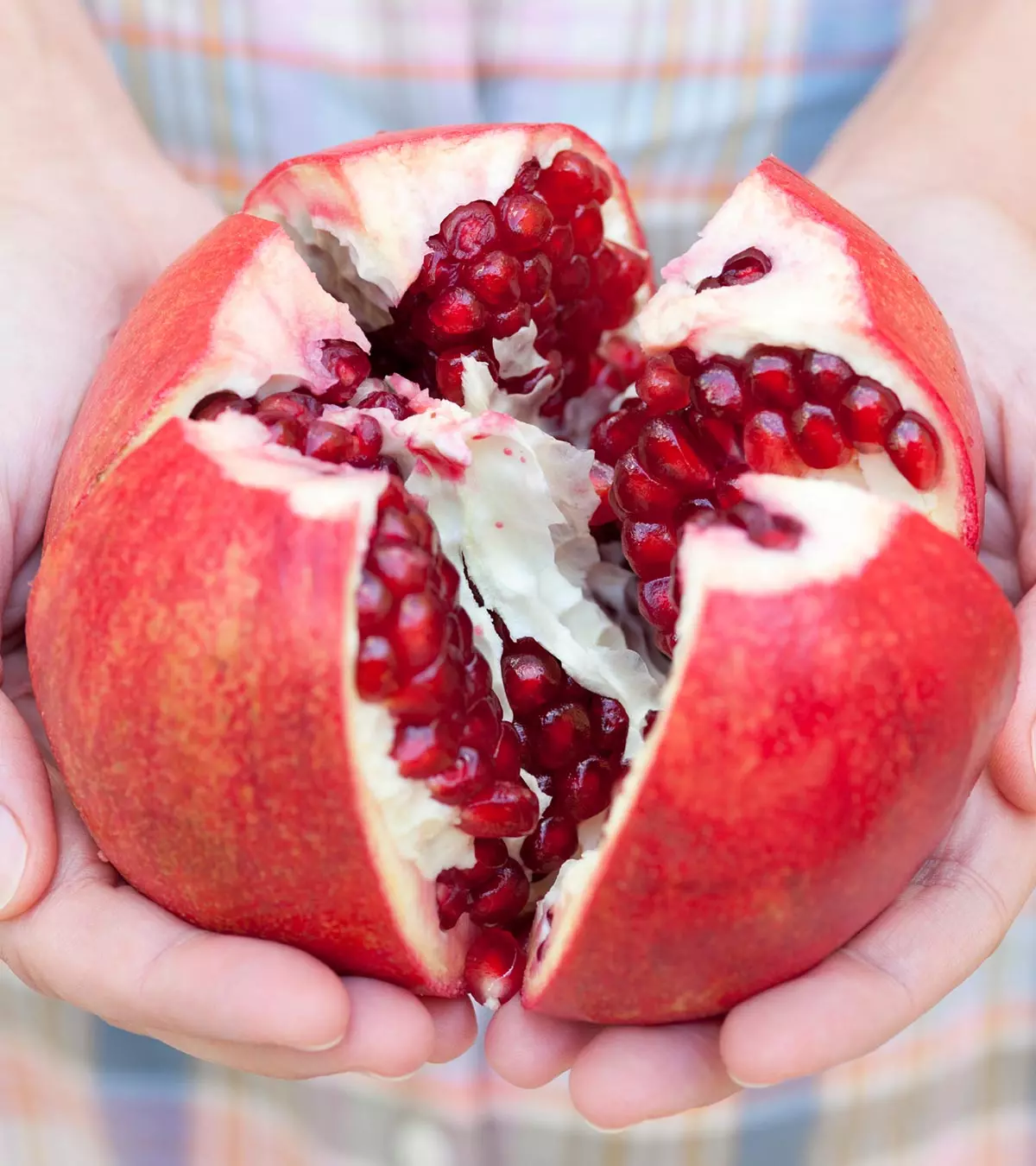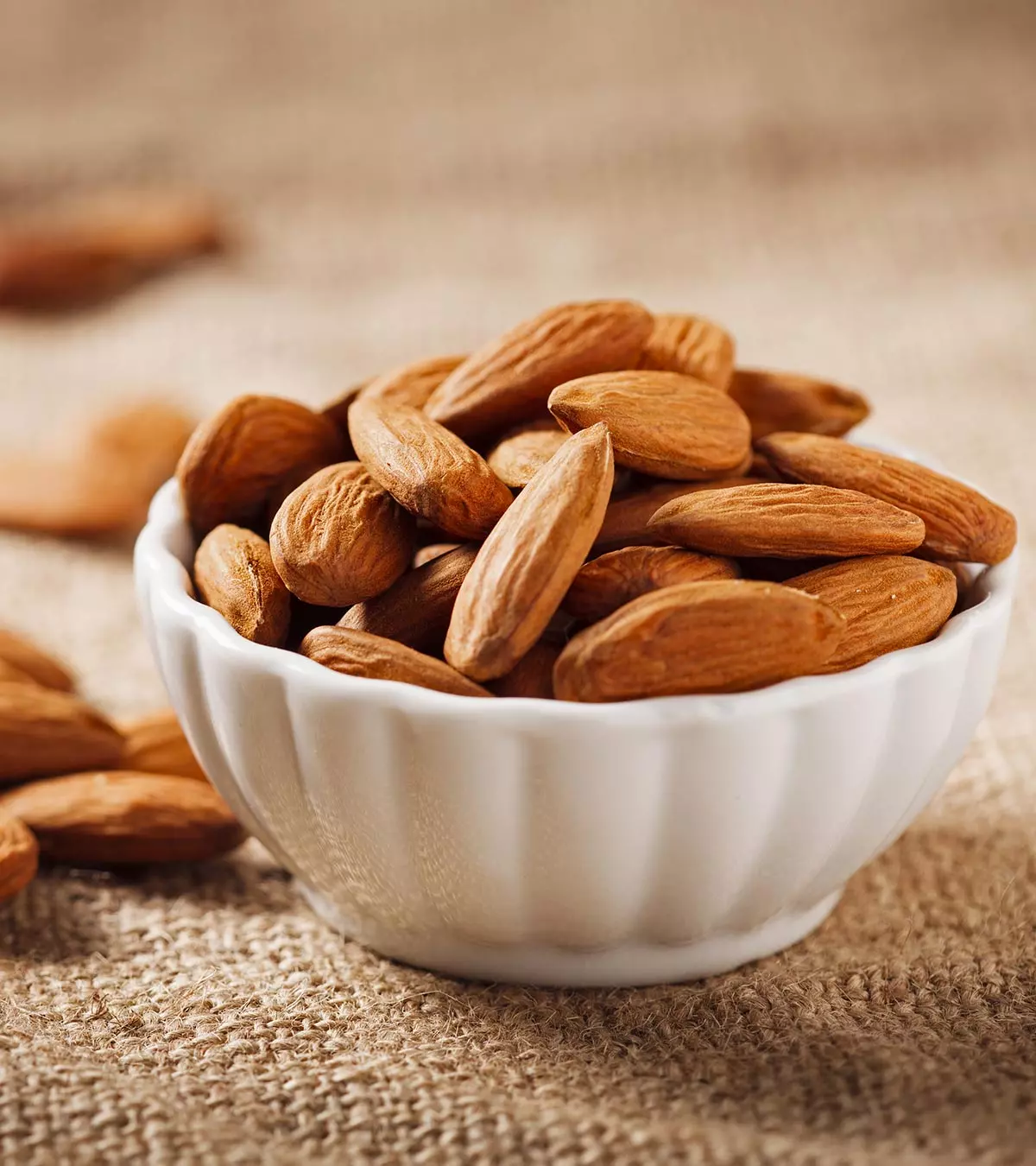
Image: Shutterstock
Diarrhea while breastfeeding could develop in a few new mothers due to underlying conditions such as acute gastroenteritisiinflammation of the lining of the stomach and the intestines. or other causes. Although this is not a serious illness requiring cessationiEnding a condition. of breastfeeding, if you have diarrhea, you must maintain proper hygiene to prevent any risks of transferring any illnesses to your newborn. In addition, ensure you get proper hydration to maintain a sufficient milk supply and prevent dehydration from diarrhea.
Mild diarrhea is usually resolved with the help of natural home remedies. However, it is best to seek a doctor’s advice for severe, long-lasting diarrhea while breastfeeding. Browse through this post to learn more about the common causes, signs, remedies, and treatment options for diarrhea in breastfeeding mothers.
Key Pointers
- Nursing mothers can develop acute or chronic diarrhea due to several infectious and non-infectious conditions.
- They should seek medical guidance if diarrhea is accompanied by additional symptoms, such as fever, chills, and weight loss.
- Staying hydrated, eating probiotics, and avoiding high-fat, high-fiber food can help manage non-severe diarrhea at home.
- Medicines for diarrhea should be consumed only after consulting an expert.
Common Causes Of Diarrhea When Breastfeeding

Various infectious and noninfectious acute and chronic conditions can cause diarrhea. Breastfeeding women can also develop diarrhea from similar causes as others. Common causes of acute diarrhea may include the following (1).
- Viral gastroenteritis (stomach bug)
- Food allergies
- Bacterial gastroenteritis
- Certain medications such as antibiotics
- Parasitic diarrhea
- Lactose intolerance causes diarrhea after consuming dairy products
- Artificial sweeteners, such as sorbitol, found in sugar-free chewing gums and candies
Gastrointestinal disorders can also cause chronic diarrhea.
- Celiac diseaseiAn autoimmune disorder that results in a reaction to gluten, a protein present in wheat, rye, and other grains.
- Irritable bowel syndromeiAn intestinal disorder that has multiple symptoms such as abdominal cramping, pain, bloating, and gassiness, among others.
- Microscopic colitisiAn intestinal inflammation that causes watery diarrhea.
- Inflammatory bowel diseases such as ulcerative colitisiUlcerative colitis and Crohn's diseaseiAn inflammation of the digestive tract that causes swelling of the tissues and leads to abdominal pain, diarrhea, weakness, and malnutrition.
- Pancreatic insufficiencyiProper functioning of the pancreas ensuring digestion and absorption of essential nutrients. (steatorrhea) diarrhea with high amounts of fat in feces
Conditions causing chronic diarrhea should be evaluated and treated by a specialist. OTC medications and natural remedies may not cure it. Breastfeeding women may also seek medical care if they develop any other symptoms such as fever, chills, abdominal pain, weight loss, or dehydration.
Washington-based board-certified lactation consultant, Lilly Hubschman-Shahar says, “If diarrhea is caused by certain medications, radiopharmaceuticals, or any of the conditions for which the CDC states breastfeeding is contraindicated, then the parent should refrain from breastfeeding. These conditions include HIV (in the absence of a suppressed viral load), Human T-cell Lymphotropic Virus 1&2, illicit drug use, Ebola virus, brucellosis, HSV, or monkeypox.”
Natural Diarrhea Treatments For Breastfeeding Moms
Diarrhea with fever or blood in loose stools needs medical care since it can be due to parasitic or bacterial infections. Mothers with diarrhea lasting more than two days should also see a doctor.
Non-severe diarrhea can be managed with home remedies. You may try the following natural remedies for non-complicated diarrhea while breastfeeding (2).
1. Stay hydrated

To maintain hydration and avoid dehydration when breastfeeding, it is important to drink plenty of clear fluids. Diarrhea causes fluid loss from the body, impacting overall health and decreasing milk supply. Nursing mothers are more at risk of dehydration since water is also taken from the body for milk production. You may consume more water than other days during diarrhea. You may also take an oral rehydration solution (ORS) as per doctors’ recommendations to cope with fluid and electrolyte loss.
You may drink diluted juices and broths other than water. Caffeinated and alcoholic beverages should be avoided since they may worsen diarrhea.
2. Eat probiotics
Probiotics products contain special microorganisms, such as yeast or bacteria. Lactobacilli or lactic acid bacterium is a well-known probiotic found in yogurt and other dairy products.
Probiotics are often recommended for people with mild diarrhea. It is believed that probiotics reach the bowel and suppress the germs that cause diarrhea and help the body recover (3).
Dairy products, such as milk, may worsen diarrhea in most people. Yogurt and kefir (fermented milk drink) is often suggested during diarrhea. However, you may avoid adding too much sugar to probiotics since sugar may worsen diarrhea.
There are also non-dairy probiotic foods and drinks, including non-dairy yogurts and kefirs, apple cider vinegar, and various krauts.
3. Drink chamomile tea

Chamomile tea is known to reduce diarrhea. Drinking a mug of chamomile tea can be beneficial. This Mediterranean herb is known for its calming effect on the body, including the gastrointestinal system (4).
4. Drink red raspberry leaf tea
Red raspberry leaf tea is a gentle and nutritious tea that acts as a mild astringentiChemical compounds that shink body tissues. to help dry up the diarrhea and tone the body. It’s safe to drink in moderate amounts up to three cups per day when pregnant or nursing.
5. Take apple cider vinegar

Apple cider vinegar may help to improve the condition of an upset stomach. You may dilute one tablespoon of apple cider vinegar in water and consume it.
 Quick fact
Quick fact6. Avoid certain foods
Maternal diet can also play a role in reducing the incidence of diarrhea. Keeping your fluid intake high and avoiding high fat, high protein, and high fiber food could reduce diarrhea and other digestive issues. Foods to avoid while breastfeeding to prevent an upset stomach include:
- Dairy products other than probiotics
- Fatty and fried foods
- Raw fruits and vegetables
- Spices
- Whole grain products
- Sugary foods and drinks
 Quick tip
Quick tip7. Take psyllium husk powder
Psyllium, derived from the plant Plantago ovata, aids in managing mild-to-moderate diarrhea by absorbing water in the digestive system, promoting firmer stool and slowing its passage. Products like Metamucil (fiber supplement) contain psyllium and offer a natural remedy for digestive discomfort (5). While its exposure to the baby through breast milk is believed to be generally low (6), it is advised to consult with a doctor for proper guidance on the duration and quantity of consumption while nursing.
8. Drink ginger tea
Ginger has been a go-to remedy for gastric issues including stomach aches and diarrhea, especially among Asians (7). To make ginger tea, grate a small piece of ginger (about an inch), toss it in a cup of water and let it simmer for ten minutes. After straining it, you may consume it with honey, if desired. However, it is advisable to consult a doctor before incorporating a new home remedy into your breastfeeding routine.
Although known to be beneficial, keep in mind that overconsumption of apple cider vinegar, chamomile tea, ginger tea, and probiotics may cause negative effects, such as vomiting and heartburn. Therefore, do not over consume any natural remedy.
Treatment For Diarrhea When Breastfeeding

The use of over-the-counter loperamide (Imodium) to treat mild diarrhea in breastfeeding mothers is controversial (8). Only minimal amounts reach breast milk since this drug is poorly absorbed from the gut. However, many physicians do not recommend its use while breastfeeding due to its mechanism of action. Loperamide is an opiate receptor agonist similar to the pain medication morphine. It works to slow the transit of stool in the gut. The US Food and Drug Administration warns that large amounts of Imodium can cause heart palpitations.
Diarrhea with fever and blood in stools requires further evaluation and could need prescription medications such as antibiotics. It is not recommended to take prescription medications while breastfeeding unless absolutely necessary since all medications are not lactation-safe. Consult a physician familiar with nursing mothers’ needs before taking any medication to ensure it is safe for you and your nursing infant. Remember to have plenty of water and easily digestible food even if you are on medication.
 Quick fact
Quick factFrequently Asked Questions
1. Can diarrhea cause a low breast milk supply in mothers?
Yes, conditions such as diarrhea may cause a low breast milk supply (9)
2. Can I breastfeed my baby while dealing with diarrhea?
Yes, you can breastfeed your baby even when dealing with diarrhea. However, you should be careful about maintaining hand hygiene. A breastfeeding mother may be able to pass the antibodies of diarrhea to her baby, which will help them fight the bacterial or viral infection (8).
3. Why do women have digestion problems after pregnancy?
After giving birth, your body needs time to heal and recover from physical changes that happen during pregnancy and childbirth. Furthermore, some women may experience intense pain and muscle soreness post-pregnancy, contributing to gastrointestinal disorders, such as constipation and bowel incontinence (10) (11).
All mothers should consciously maintain hand hygiene and consume hygienically prepared foods to avoid diarrhea while breastfeeding. As diarrhea drains you out of energy, it may make you more tired while breastfeeding. Moreover, if you face acute diarrhea or chronic diarrhea issues, consult a doctor to seek professional medical care for correct diagnosis and management. Also, remember to wash your hands frequently and clean all vegetables bought from grocery stores. It is better to try natural methods of controlling the issue as much as possible.
Infographic: Significance Of The BRAT Diet In Diarrhea
Dietary modifications may help control stomach problems such as diarrhea. Easy-to-digest foods are often recommended for diarrhea. However, it should not be continued for long durations as such a diet may not provide enough nutrients, especially when breastfeeding, where nutritional demands are high. The infographic below discusses the BRAT diet and how it may control diarrhea. Illustration: Momjunction Design Team
Illustration: Diarrhea While Breastfeeding: Causes And Natural Remedies

Image: Dalle E/MomJunction Design Team
When breastfed children are shifted to a diet of formula it may take them a while to get used to it. There is no need for concern. Watch this video to understand how your child will react to such a change in diet.
References
1. Symptoms & Causes of Diarrhea; National Institute of Diabetes and Digestive and Kidney Diseases
2. Loose Motions; Medicover Hospitals
3. Probiotics for Prevention and Treatment of Diarrhea; U.S. National Library of Medicine
4. Chamomile: A herbal medicine of the past with bright future; U.S. National Library of Medicine
5. Psyllium; Mont Sinai
6. Laxatives; MotherToBaby
7. Herbs at a glance; National Institute of Health
8. Diarrhea (Acute) and Breastfeeding Mothers; The Breastfeeding Network
9. Food-borne and Waterborne Illness; CDC
10. First days after birth; Department of Health, State Government of Victoria
11. Common Conditions; University of Rochester Medical Center Rochester
12. Nutrition Tips For Controlling Diarrhea; UCSF Health
13. Food-borne and Waterborne Illness; CDC
Community Experiences
Join the conversation and become a part of our nurturing community! Share your stories, experiences, and insights to connect with fellow parents.
Read full bio of Dr. Arlene Dijamco
- Dr. Lilly Hubschman-Shahar is the vice-president of Clinical Services at Nest Collaborative. At Nest, she is responsible for ensuring the standard of lactation care. Lilly has worked in maternal-child health for the past 14 years as a neonatal RN and NP and IBCLC. She did her Doctor of Nursing Practice from Arizona State University.
 Dr. Lilly Hubschman-Shahar is the vice-president of Clinical Services at Nest Collaborative. At Nest, she is responsible for ensuring the standard of lactation care. Lilly has worked in maternal-child health for the past 14 years as a neonatal RN and NP and IBCLC. She did her Doctor of Nursing Practice from Arizona State University.
Dr. Lilly Hubschman-Shahar is the vice-president of Clinical Services at Nest Collaborative. At Nest, she is responsible for ensuring the standard of lactation care. Lilly has worked in maternal-child health for the past 14 years as a neonatal RN and NP and IBCLC. She did her Doctor of Nursing Practice from Arizona State University.
Read full bio of Dr. Ritika Shah
Read full bio of Swati Patwal
Read full bio of Ghazia Shah


















